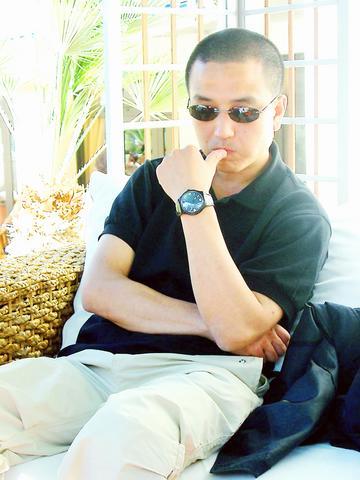He has been labeled as another Wong Kar-wai (王家衛) and his work has been compared to that of Krzysztof Kieslowski. He is Lou Ye, one of the most charismatic of China's sixth generation filmmakers.
Compared to contemporaries Jia Zhangke (

PHOTO: YU SEN-LUN, TAIPEI TIMES
Lou pays lots of attention to the light and color in his films, and his stories are more likely to revolve around topics like love and fate, coincidences and possibility.
Suzhou River, Lou's previous film, tells such a story of a man encountering two mysterious women who look almost identical. One is an ordinary little girl, the other a bar performer who wears a mermaid costume. At different times and in places, he falls for each of them, and they proceed to change his life and that of the people around him. The film was selected by Time magazine as one of the best films of 2000.
In Purple Butterfly, Lou uses non-lineal narration and handheld camera to tell a story of the glamor of Shanghai between the wars. Purple Butterfly fails to knit together as well as Suzhou River, and Lou gets a little self-indulgent in exploring how fate manipulates people, a preoccupation that he pursues at the expense of building characters we can believe in. Ultimately, it is more visually impressive that narratively effective.
For all that, Lou has managed, in just three films, to establish himself as an important Chinese filmmaker. No mean feat.

This is the year that the demographic crisis will begin to impact people’s lives. This will create pressures on treatment and hiring of foreigners. Regardless of whatever technological breakthroughs happen, the real value will come from digesting and productively applying existing technologies in new and creative ways. INTRODUCING BASIC SERVICES BREAKDOWNS At some point soon, we will begin to witness a breakdown in basic services. Initially, it will be limited and sporadic, but the frequency and newsworthiness of the incidents will only continue to accelerate dramatically in the coming years. Here in central Taiwan, many basic services are severely understaffed, and

Jan. 5 to Jan. 11 Of the more than 3,000km of sugar railway that once criss-crossed central and southern Taiwan, just 16.1km remain in operation today. By the time Dafydd Fell began photographing the network in earnest in 1994, it was already well past its heyday. The system had been significantly cut back, leaving behind abandoned stations, rusting rolling stock and crumbling facilities. This reduction continued during the five years of his documentation, adding urgency to his task. As passenger services had already ceased by then, Fell had to wait for the sugarcane harvest season each year, which typically ran from

It is a soulful folk song, filled with feeling and history: A love-stricken young man tells God about his hopes and dreams of happiness. Generations of Uighurs, the Turkic ethnic minority in China’s Xinjiang region, have played it at parties and weddings. But today, if they download it, play it or share it online, they risk ending up in prison. Besh pede, a popular Uighur folk ballad, is among dozens of Uighur-language songs that have been deemed “problematic” by Xinjiang authorities, according to a recording of a meeting held by police and other local officials in the historic city of Kashgar in

It’s a good thing that 2025 is over. Yes, I fully expect we will look back on the year with nostalgia, once we have experienced this year and 2027. Traditionally at New Years much discourse is devoted to discussing what happened the previous year. Let’s have a look at what didn’t happen. Many bad things did not happen. The People’s Republic of China (PRC) did not attack Taiwan. We didn’t have a massive, destructive earthquake or drought. We didn’t have a major human pandemic. No widespread unemployment or other destructive social events. Nothing serious was done about Taiwan’s swelling birth rate catastrophe.